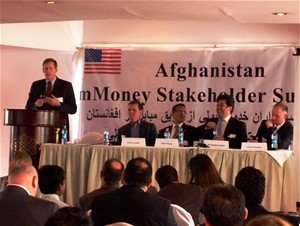
Representatives from Afghanistan's four mobile network operators speak at the USAID-sponsored mMoney Stakeholder Summit.
USAID/FAIDA
Afghanistan takes a giant economic step forward with the introduction of mobile money nationwide
4 NOVEMBER 2011 | KABUL, AFGHANISTAN
The campaign for a nationwide rollout of “mobile money” in Afghanistan moved a step closer with the founding of the Afghan Mobile Money Operators Association in May 2011. The association is the first such trade organization in Afghanistan and among the first in the world. For Afghanistan, which ranks at or near the bottom in nearly every World Bank economic measurement, mobile money would be a solid foundation in a functioning market economy to help accelerate economic growth.
Currently in the pilot phase in Afghanistan, mobile money enables mobile phone users to receive salaries and make payments without needing a credit card or even a bank account.
Etisalat Business Director Medhat Dessouki explains why his company joined the association. “It’s due to USAID’s support and its efforts to get all the [mobile network operators] in Afghanistan to sit at one table. Also, my company wants to contribute to the economic development of Afghanistan and its people by creating employment opportunities.” Chris Lundh of Afghan Wireless adds that joining was an easy decision. “We were asked [to join] and agreed to support the association, simple as that. USAID provides a lot of added value.”
The association’s founding members are Afghanistan’s four mobile network operators, Afghan Wireless, Etisalat, MTN, and Roshan. The association’s first president, Roshan M-Paisa President Zahir Khoja, said, “The organization is new to Afghanistan and new to the world. Being organized makes it easier for us to come together on regulatory issues and other issues of common concern.” Such concerns include platform interoperability, consumer protection, and changes to regulations that will ease the introduction of mobile money.
Khoja believes the association can help Afghanistan become one of the world’s mobile money pioneers. “Being organized means we are not acting independently on critical issues…we’re lending our collective experience and intelligence to make mobile money a reality,” said Khoja.
In an effort to expand services, the association and USAID will sponsor a contest that will award prizes in January 2012 to Afghan university students for the best mobile money applications in categories such as agriculture, government service delivery, women’s empowerment, and small business development.







Comment
Make a general inquiry or suggest an improvement.